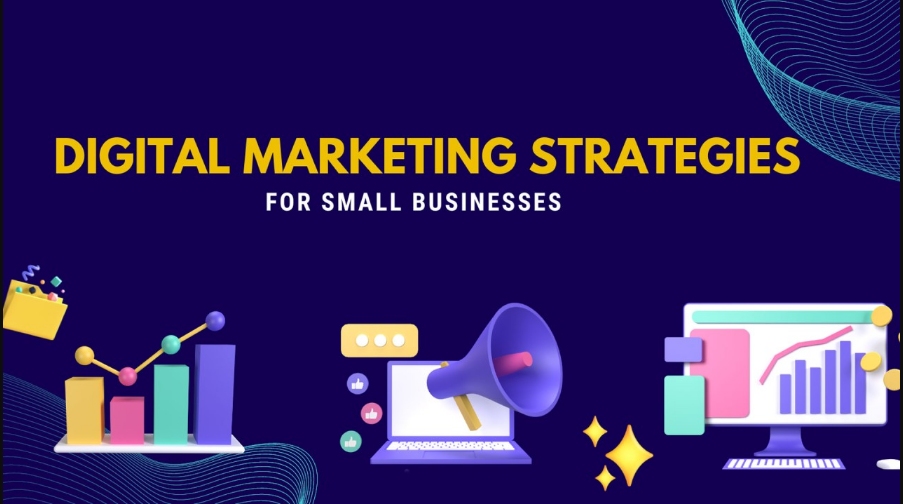In today’s digital age, small businesses have numerous opportunities to grow and succeed through effective digital marketing strategies. This article explores ten proven strategies that small businesses can leverage to enhance their online presence, reach their target audience, and achieve marketing success.

Understanding Digital Marketing for Small Businesses
Digital marketing encompasses a range of online strategies and tactics aimed at promoting products or services, building brand awareness, and driving customer engagement. For small businesses, digital marketing is essential for competing in the modern marketplace and reaching potential customers where they spend much of their time – online.

10 Proven Digital Marketing Strategies

- Search Engine Optimization (SEO)
SEO, or Search Engine Optimization, is about enhancing your website and content to appear higher in search engine results. This involves strategically using keywords that your target audience is likely to search for. Creating valuable, high-quality content that addresses their needs and interests is key. Improving website performance, such as faster loading times and mobile responsiveness, enhances user experience and boosts rankings.
These efforts help small businesses attract organic traffic, meaning visitors who find your site naturally through search engines, leading to increased visibility and potential customer engagement.
| Aspect | Explanation |
| Keywords | Strategic use of relevant keywords in website content and meta tags for search engine visibility. |
| Content Quality | Creation of high-quality, valuable content that addresses user needs and interests. |
| Website Performance | Optimization of website speed, mobile responsiveness, and user experience for better rankings. |
| Organic Traffic | Attracting visitors naturally through search engines, indicating relevance and trustworthiness. |
| Visibility and Engagement | Improved search rankings lead to increased visibility, potential customer engagement, and brand recognition. |
2. Content Marketing
Content marketing focuses on creating and distributing valuable, relevant content to attract and engage a target audience. This includes blog posts, articles, videos, infographics, and more. By providing valuable information, businesses can establish authority, build trust, and drive conversions.
3. Social Media Marketing
Social media platforms like Facebook, Instagram, Twitter, LinkedIn, and TikTok offer powerful tools for connecting with customers, sharing content, running ads, and building brand awareness. Small businesses can use social media to engage with their audience, showcase products or services, and drive website traffic.
4. Email Marketing
Email marketing remains one of the most effective ways to nurture leads, promote products, and drive conversions. By building an email list and sending targeted campaigns, businesses can stay connected with customers, deliver personalized content, and encourage repeat purchases.
5. Pay-Per-Click (PPC) Advertising
PPC advertising, such as Google Ads and Facebook Ads, allows businesses to bid on keywords and display ads to targeted audiences. With PPC, small businesses can reach potential customers quickly, track campaign performance, and optimize ad spend for maximum ROI.
- PPC advertising, like Google Ads and Facebook Ads, enables businesses to bid on keywords and display ads to specific audiences based on their interests and demographics.
- This targeted approach helps businesses reach potential customers quickly, increasing the chances of generating leads and conversions.
- With PPC, businesses can track campaign performance in real-time, analyzing metrics like click-through rates (CTR), conversion rates, and cost per acquisition (CPA).
- By monitoring these metrics, businesses can optimize their ad campaigns, adjusting bids, ad copy, and targeting to improve ROI and maximize ad spend efficiency.
6. Influencer Marketing
Collaborating with influencers in your industry or niche can help small businesses reach new audiences, build credibility, and increase brand awareness. Influencers can create authentic content that resonates with their followers, driving engagement and potentially leading to conversions.
7. Video Marketing
Video content is highly engaging and can effectively convey messages, showcase products, and tell stories. Small businesses can use platforms like YouTube, Instagram Reels, and TikTok to create and share videos that capture audience attention and drive engagement.
8. Local SEO
For small businesses targeting local customers, optimizing for local search is crucial. This includes creating a Google My Business profile, obtaining online reviews, optimizing for local keywords, and ensuring accurate business information across online directories.
9. Mobile Marketing
With the increasing use of smartphones, mobile marketing is essential for reaching on-the-go consumers. Small businesses can optimize their websites for mobile devices, create mobile-friendly content, and use SMS marketing, mobile apps, and push notifications to engage customers.
10. Analytics and Data-driven Insights
Measuring the performance of digital marketing efforts is key to optimizing strategies and achieving results. Small businesses should use analytics tools like Google Analytics, social media insights, and email marketing metrics to track KPIs, analyze data, and make data-driven decisions.
Implementing Digital Marketing Strategies

Small businesses should develop a comprehensive digital marketing plan that integrates these strategies, identifies target audiences, sets clear objectives, and outlines tactics for implementation. Consistency, creativity, and adaptation to market trends are key to success.
Conclusion
Effective digital marketing is essential for small businesses to compete, grow, and thrive in today’s digital economy. By implementing proven strategies, measuring performance, overcoming challenges, and adapting to future trends, small businesses can achieve marketing success and reach their goals.
Read more : How Content Writing can Boost Your Business
FAQs
Digital marketing helps small businesses reach a global audience, target specific demographics, track performance, and generate leads and conversions cost-effectively.
Small businesses can measure success through key performance indicators (KPIs) such as website traffic, conversion rates, social media engagement, email open rates, and ROI.
Challenges include budget constraints, resource limitations, competition, and staying updated with evolving trends and technologies.
Future trends include AI-driven personalization, voice search optimization, interactive content, virtual experiences, and sustainability-focused marketing.




